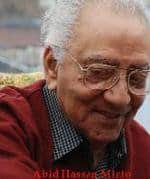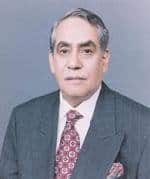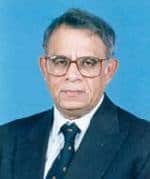President of National Workers Party (NWP)

Abid Hassan Minto aka Abid Minto (born 3 February 1932, Rawalpindi, Pakistan) is a constitutional expert and senior lawyer of the Supreme Court of Pakistan. He is also a literary critic and a leftwing civic and political leader. His legal career spans over 50 years during which he was elected member of the Pakistan Bar Council from 1966 up to 1983; President, Lahore High Court Bar Association (1982);[1] Chairman, National Coordination Committee of Lawyers (1981 to 1985) and President, Supreme Court Bar Association of Pakistan (SCBA) (1997 to 1999). Minto has also been affiliated with the International Association of Democratic Lawyers (IADL) in which he was elected vice president at its Barcelona Congress (1990) and Bureau Member at its Cape Town Congress (1995). He was professor of law at the Law College of the Punjab University (Punjab University Law College) 1963 to 1983.
Education
Minto attended Islamia High School, Rawalpindi and Gordon College (Rawalpindi). He received his law degree (LL.B) from the Punjab University Law College in 1955. While at Law College he was elected President of the Students Union and won and retained the title of “Best All Pakistan Debater” for four years.
Political Beginning
Minto became a member of The Communist Party of Pakistan (CPP) in 1949 and remained with it until it was banned in 1954 after the Rawalpindi Conspiracy Case along with the Democratic Students Federation (DSF) which was also co-founded by Minto in 1949 while at Gordon College. The DSF had been popular in all four provinces and was succeeded, after its ban, by the National Students Federation (NSF) which exists to date.
Trade unions: In his younger days Minto was an active Trade Unionist and organized the Military Engineering Service (MES) Workers Union. He worked for the Attock Oil Company Workers Union in Rawalpindi and the Railway Workers Union which was led by Mirza Muhammad Ibrahim, a veteran trade union leader of the Indo Pak sub continent. Minto was a member of the Central Executive of the Pakistan Trade Union Federation (affiliated with the World Federation of Trade Unions) from 1967–1986.
Farmers/peasants: Minto’s ties with local peasant movements are in place to date. Along with veteran peasant leader Chaudhry Fateh Muhammad, he has worked to organize Kissan (peasant) Committees (کسان کمیٹی) in rural Punjab. These committees provide local farmers with a platform for discussion and action in respect to the problems faced by them in Pakistan’s agrarian society where ownership of land vests predominantly in big landowners.
Legal career (1955-)
Minto began law practice in 1955 at Rawalpindi where his father and, before him, his grandfather had also practiced. He moved to Lahore in 1958, was admitted, Advocate of the Lahore High Court in 1957 and of the Supreme Court of Pakistan in 1963. He remains a practicing lawyer and is the Senior Consultant to “Minto and Mirza [4][5], a Lahore based law firm.
Minto conducted several cases of constitutional, political and legal importance. These include:
The Ganga Hijacking Case: Minto appeared for one of the accused, Hashim Qureshi, before a special tribunal set up to try Kashmiri freedom fighters who had hijacked an Indian aircraft into Pakistan.
The Hyderabad Conspiracy Case: Minto appeared before the Hyderabad tribunal to defend political leaders Abdul Wali Khan, Ghaus Bakhsh Bizenjo, Ataullah Mengal, Mir Gul Khan Nasir, Nawab Khair Bakhsh Marri and others who had been charged with treason and for working against the Ideology of Pakistan.
Farooq Ahmad Khan Leghari (Farooq Leghari) versus The Federation: Minto appeared as President, Supreme Court Bar Association of Pakistan to assist the Supreme Court of Pakistan on the question of the validity of imposition of Emergency and suspension of constitutional Fundamental Rights by the President of Pakistan.
Minto has appeared in a large number of cases involving issues such as:
Section 295 C of the Pakistan Penal Code, aka “Blasphemy law in Pakistan”, which prescribes the death penalty for defiling the name of the prophet Muhammad.
The Islamic “Law of Evidence” or the “Qanun e Shahadat” which discriminated against women in that it considers their evidence as not at par with men in certain matters. This law was brought into being during the dictatorship of General Zia-ul-Haq.
The controversy attached to The law of Evidence gave birth to a women’s rights movement in Pakistan calling for equal rights and equal treatment for women in all matters.(For more on Women’s Movement in Pakistan see Women’s Action Forum)
Some of the other issues in Minto’s legal battles include:
Constitutional right of workers to form Trade Unions.
Electoral laws providing for a separate electoral college for minority religions.
Discrimination against women preventing them from competing with men for admission to certain educational institutions.
Dissolution of federal and provincial legislatures by the President of Pakistan and Governors of provinces.
Politics
Minto is currently the elected President of Workers Party of Pakistan[6] (WPP), founded on 20–21 March 2010 following a merger of five leftwing parties of Pakistan.
Background: In 1967 Minto joined the National Awami Party (NAP Balochistan). The following year, at the party’s general elections in Dacca, Bangladesh (then East Pakistan) he was elected member of its Central Executive Committee. In 1971, on the eve of East Pakistan’s separation from (West) Pakistan, a number of leftwing political workers from NAP and other groups, held a conference and founded the Pakistan Socialist Party (PSP). C. R. Aslam, a veteran communist leader was elected President while Minto was elected first General Secretary. He stayed with PSP until 1986 and was elected General Secretary three times. Following a split in the PSP in 1986, Minto founded the Awami Jamhoori Party (Peoples Democratic Party) in 1987, comprising dissidents from the PSP and members of a Sindh based left group called the Communist League. On 1 May 1999, the Awami Jamhoori Party, Pakistan Socialist Party and a faction of Pakistan National Party (led by Baloch leader Ghaus Bakhsh Bizenjo) formed the National Workers’ Party. Minto was elected its first President. NWP was a part of the All Pakistan Democratic Movement (APDM) in lawyers movement. Minto was elected first President of Workers Party of Pakistan, formed after the merger of five leftwing parties and groups (Communist Mazdoor Kisan Party,National Workers Party,Peoples Rights Movement,Watan Dost Mazdoor Federation, Awami Mazdoor Anjuman) and holds the office to date by election.
Arrests: For his politics generally, and especially during the lawyers movement against General Zia ul Haq, Minto faced arrests and detentions several times.
Family and family name
The family name “Minto” was originally “Manto” or “Mantu” and is still used as such by most of the “Mantu” family. “Mantu” like Kichlu, Sapru, Nehru, and Kaatju, signifies a caste of Hindu Brahmin pandits from Kashmir a number of whom migrated to Amritsar, now in the Indian Punjab and then to Rawalpindi. Minto’s father Khawaja Ahmad Hassan (1896—1982), a well known civil lawyer in Rawalpindi was a leader of the Indian National Congress until 1943 later joining the Muslim League to play a role in its local politics during the Pakistan movement. Khawaja Ahmad Hassan was a nephew of the Indian Nationalist Leader Saifuddin Kichlu who was also the paternal uncle of Minto’s mother, Aziz Begum (1895—1981). The Urdu short story writer Saadat Hassan Manto (1912—1955) was Minto’s great-grand uncle. In 1961 Minto married Tasnim Minto née Kausar (1935–), herself a writer who has published a collection of short stories “Zara si Baat ذرا سی بات”[8] (“A Small Matter”). They have three children, two daughters and a son, from the marriage.








